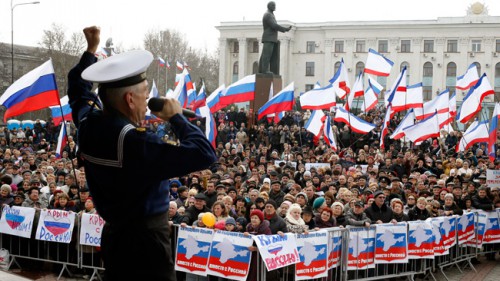vendredi, 14 mars 2014
On the Russian Annexation of Crimea

On the Russian Annexation of Crimea
By Guillaume Faye
Ex: http://www.counter-currents.com
Translated by Greg Johnson
The Crimean parliament has called for independence from Ukraine and a referendum over joining the Russian Federation. Thunder in the chancelleries! The Crimean authorities are illegitimate because they are self-proclaimed. Who is right, who is wrong?
Barack Obama said on March 6 that the planned referendum for joining Russia would be undemocratic and illegal. (See previous articles on this point). He was followed in this analysis by the European governments. So, the decisions of the people are supposed to be illegitimate if they do not support the interests and ideology of what the Russians call the “Western powers.” Democracy is, therefore, a rubber standard.
Here we encounter a very old problem: the principle of nationality in the ethnic sense against the same principle in the political sense. Let me explain. Politically, the detachment of Crimea from Ukraine is actually illegal under the constitution of Ukraine, a Republic “one and indivisible” like France. But Ukraine is a very unstable, indeed divided nation state. Imagine that tomorrow in France a majority of Bretons or Corsicans wanted to unconstitutionally secede.[1] Worse still, imagine a future region of France populated after decades of colonization migration by an Arab-Muslim majority desiring autonomy or attachment to an overseas Mediterranean country . . .
The same problem happens all over the world: in Spain with the Catalans, in Britain with the Scots, in Belgium with the Flemings, in Israel with Muslim citizens who have higher rate of population growth. Many examples exist in Africa and Asia. Remember Kosovo, torn away from Serbia because Albanians became the majority? In that case, the Americans and the West agreed to the partition of Serbia! They are no longer for partition in Crimea. A double standard.
Americans would do well proclaiming their principles carefully. For what if a Hispanic majority emerges in the Southwestern states (through immigration and high fertility) and demands to rejoin Mexico? That is a real risk in the next 20 years . . . This brings us to the old conflict between legality and legitimacy, thoroughly analyzed by Carl Schmitt. And it also makes us reflect on the concept of the multiethnic state (imperial/federal), which historically has always been difficult to manage and quite unstable.
In the minds of Putin and the Kremlin, Crimea historically belongs to Russia: it is predominantly Russian-speaking and houses part of the fleet. Putin wants to restore Russia, not to the borders of the USSR but to those of Catherine the Great, the Russian Empire, which the ambitious Vladimir wishes to defend. Then what? Of course, Vladimir Putin wants to appear to his people as the one who brought back the (formerly Russian) Crimea to the motherland and wants to restore the Russian international power.
Putin handled the crisis smoothly, using good judo to turn to his advantage the aggressive moves of his opponents, including the EU, NATO, and the U.S., to draw Ukraine into their fold.[2] It is a major geopolitical mistake to provoke Russia instead of respecting its sphere of influence, pushing it into the arms of China. It is stupid to revive the Cold War. Russophobia is not in the interests of Europeans. Russian power is not a threat, it is an opportunity. Presenting Putin’s Russia as a threat to “democracy” is the sort of lazy propaganda championed by the attention whore and professional dilettante Bernard-Henri Lévy. Of course, Washington’s policy (which is logical) is both to prevent Russia from once again becoming a great power and decoupling the EU and Russia: it is a general trend.
Meanwhile, the Ukrainian crisis is just beginning. This improbable country will probably not find a stable balance. Crimea will probably end up being part of Russia. Eastern and Southern Ukraine may become quasi-protectorates tied to Russia. The Western region, under the influence of “nationalist” and pro-Western Ukrainians has a more complicated fate. Indeed, Ukrainian nationalism faces a fundamental contradiction, for they are attracted to the EU, but it is committed to a cosmopolitan ideology opposed to all nationalism. And all “ethnic hatred.” This cannot be overcome. There is an inherent incompatibility between Ukrainian nationalism and the EU’s ideological vulgate, which many do not understand.
In history, there are often insoluble problems. My Russian friend Pavel Tulayev, who has published me in Russia, understands this well: the union of all peoples of European descent from the Atlantic to the Pacific is the only way, regardless of political organization. The Ukraine crisis is a resurgence of the 19th and 20th centuries. But we are in the 21st century.
Notes
1. Already the “Red Hats” present Breton autonomist claims against the French State tax, yet they do not belong to the traditional Breton autonomy and independence movement. Good food for thought . . .
2. In addition, Putin played upon the new authorities in Kiev’s measures against Russian speakers.
Article printed from Counter-Currents Publishing: http://www.counter-currents.com
URL to article: http://www.counter-currents.com/2014/03/on-the-russian-annexation-of-crimea/
URLs in this post:
[1] Image: http://www.counter-currents.com/wp-content/uploads/2014/03/crimea_from_space.jpg
00:05 Publié dans Actualité, Affaires européennes | Lien permanent | Commentaires (0) | Tags : guillaume faye, crimée, russie, ukraine, europe, affaires européennes, géopolitique, politique internationale, mer noire |  |
|  del.icio.us |
del.icio.us |  |
|  Digg |
Digg | ![]() Facebook
Facebook



Les commentaires sont fermés.